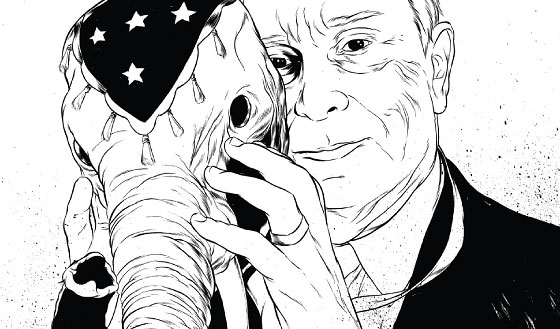
Mayor Mike Bloomberg is an independent—debatably in political ideology, but certainly in political registration. And for him, that’s become a problem: The mayoral primaries are now less than six months away, and ballot petitions begin circulating in July, yet Bloomberg is still strenuously trying to persuade any three out of the city’s five Republican county chairmen to take him back for ballot-line purposes.
The real reason for that desperation, however, has been somewhat mysterious. There is clearly a marketing advantage to the two major party lines: They are at eye level on the upper left side of the ballot in rows A and B. Third-party candidates are relegated to more-obscure voting-booth real estate. But tens of millions of dollars in ads and Election Day palm cards would ensure that voters can find Bloomberg’s name, or the mayor could claim multiple ballot locations by securing the Working Families or Independence Party slots. Bloomberg’s strategists also cite a more nebulous consideration: “grounding” the mayor in the minds of voters by giving him the seal of approval of one of the two dominant parties. But New York elected John Lindsay as a Liberal-Independent in 1969, when the major parties’ hold on voters was a whole lot stronger than it is now.
The unspoken reason Bloomberg is going through contortions to run on the Republican line is that he’s scared of Republican voters. Not that Bloomberg’s campaign team thinks any other potential GOP candidate has a prayer of winning; you won’t ever see the phrase “Mayor John Catsimatidis” on city stationery. But Bloomberg’s many strategists are worried that the existence of any sentient mammal on the Republican mayoral line will give Republican voters mad at Bloomberg an easy place to express their anger. Some city GOP voters dislike the mayor’s policies—everything from property-tax increases to his push for congestion pricing. Others disdain his adoption (in 2001, to avoid a crowded Democratic primary field) and rejection (in 2007, when he wanted to run for president) of the party’s banner for selfish political needs.
Bloomberg already has Brooklyn’s Republican boss on his side, and Staten Island is nearly in line; he will probably sway Manhattan, either through his charm offensive or with the help of some well-aimed contributions to party causes. But if the mayor is somehow forced to run as an independent in a three-way contest, are there enough Bloomberg-hating Republicans to hand City Hall to Democrat Bill Thompson? “In a close race, yes,” one campaign strategist says, remembering that in 2001, Bloomberg won by a mere 68,000 votes in a two-way race. “And there’s a growing spread between high job approval and low reelect poll numbers for even safe politicians. Voters want to take out their anger on somebody.”
The campaign’s overriding fear is surging, pan-partisan populist disgust. Bloomberg’s aides don’t believe Thompson is capable of harnessing it, but they’re nevertheless trying to shrink the number of ways in which the mayor can become an anti-incumbent punching bag. It’s the conventional play. The irony would be if the maneuvering ends up making Bloomberg more vulnerable: Just as voters are in the mood to throw the bums out, he’s throwing away one of his claims to political independence.
Have good intel? Send tips to intel@nymag.com.